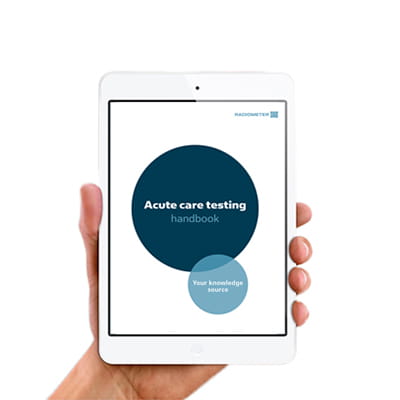Printed from acutecaretesting.org
June 2017
The value of procalcitonin testing – a review of recent research
Summarized from Sager R, Kutz A, Mueller B et al. Procalcitonin-guided diagnosis and antibiotic stewardship revisited. BMC Medicine 2017; 15: 15
Procalcitonin (PCT) is a peptide (116 amino acids) precursor of the calcium-regulating thyroid hormone, calcitonin. Serum/plasma levels are very low (<0.1 ng/mL) or even undetectable in healthy individuals. However, in response to cytokine release during systemic inflammation, PCT synthesis increases in extra-thyroidal tissue (liver, lung, kidney adipose) and serum/plasma concentration increases.
This increase is particularly marked in bacterial infection; first measurable increase is detectable within 2-4 hours and maximal levels (up to 100 ng/L) within 12-24 hours. Resolution of the infection with effective antibiotic therapy is associated with rapid (within 24 hours) reduction in serum/plasma PCT.
The first study to identify a clinical utility of PCT as a blood marker of infection was published in 1993, but research in this area has intensified over the past 15 years. This recently published review by authors involved in some of this research focuses on studies conducted in the past 5 years and thus allows an up-to-date account of the clinical utility (and limitations) of PCT measurement for both diagnosis of infectious (bacterial) disease and optimal use (stewardship) of antibiotic therapy.
In reviewing the results of 66 studies published in the past 5 years the authors categorized the evidence-based value of PCT in a wide range of infectious conditions. Four categories were used: no evidence in favor of PCT testing (-); moderate evidence in favor of PCT testing (+); good evidence in favor of PCT testing (++); and finally, strong evidence in favor of PCT testing (+++).
The authors find ”strong evidence in favor of PCT testing (+++)” in the context of the following conditions: community-acquired pneumonia; upper respiratory tract infection (URTI); severe sepsis/shock; and meningitis. They outline results of studies that demonstrate that the use of PCT significantly reduces the length of antibiotic treatment in patients with community-acquired pneumonia and severe sepsis/shock, without adverse effect.
Other recent studies have shown that PCT testing can serve to limit antibiotic prescription to primary care patients with URTI and PCT testing can be used to help distinguish bacterial from viral meningitis.
The authors find ”good evidence in favor of PCT testing (++)” for the following: guiding antibiotic therapy in acute exacerbation of chronic obstructive pulmonary disease (COPD), bronchitis and asthma; identifying infection in patients with heart failure; limiting the use of antibiotics in urinary tract infection; and identifying postoperative infection.
Two valuable PCT algorithms are included in this review article which reflect the results of some of the studies discussed; the first demonstrates in detail how results of PCT testing can be used to guide antibiotic therapy in emergency room patients with respiratory infection, and the second demonstrates in detail how results of PCT testing can be used to guide antibiotic therapy in ICU patients with sepsis/septic shock.
The ever-emerging risk of bacterial resistance to available antimicrobials has driven healthcare initiatives aimed at reducing antibiotic overuse. One aspect of these initiatives is tailoring antibiotic therapy to individual needs of the patient. As this review makes clear there is now considerable evidence to suggest that measurement of patients PCT provides a safe and effective means of tailoring antibiotic therapy in a range of infectious diseases.
May contain information that is not supported by performance and intended use claims of Radiometer's products. See also Legal info.
Acute care testing handbook
Get the acute care testing handbook
Your practical guide to critical parameters in acute care testing.
Download nowScientific webinars
Check out the list of webinars
Radiometer and acutecaretesting.org present free educational webinars on topics surrounding acute care testing presented by international experts.
Go to webinars







